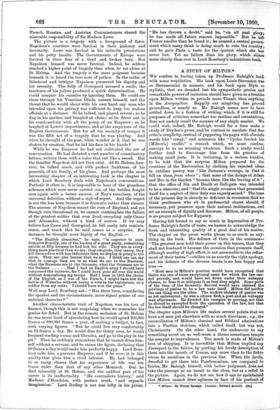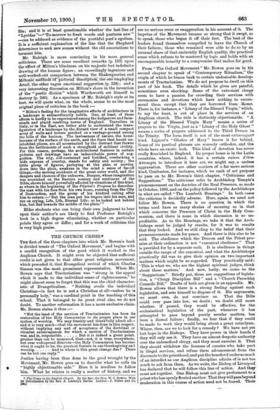A STUDY OF MILTON.* Wn confess to having taken up
Professor Raleigh's book with some trepidation. His book upon Louis Stevenson wis so Stevensonian in manner, and his book upon Style so stylistic, that we dreaded lest his sympathetic genius and remarkable powers of imitation should have given us a treatise
upon Milton written In periods more Titanic than ankthing in the Areopagitica. Happily our misgiving has proved groundless, or nearly so. Mr. Raleigh seems now to have settled down to a fashion of writing which, if it is still for purposes of criticism somewhat too restless and ostentatious, does not unduly recall the manner of any single master. We could wish, indeed, Mr. Raleigh would for a time make a study of Dryden's prose, and be content to emulate that fine critic's simplicity, instead of peppering his pages with obsolete words like "repay," and sentences like "Cycles ferried. his [Milton's] cradle," a remark which, we must confess, conveys to us no meaning whatever. Such a study would further tend to discourage him from the practice of making small jests. It is irritating, in a serious treatise, to be told that the surprise Milton prepared for the courtiers of the Restoration by clothing his rejected ideas in sublime poetry was " like Samson's revenge, in that it fell on them from above" ; that none of the doings of. Adam and Eve in the Garden "became them like the leaving of it "; that the office of Sin and Death at Hell-gate was intended to be a sinecure; and " that the single occasion that presented itself for a neglect of their duty was eagerly seized." The tone of the present day is already so deficient in reverence that we think gentlemen who sit in professorial chairs should, if necessary, put pressure upon their natural inclinations, and set an example of dignity and decorum. Milton, of all people, is no proper subject for flippancy. . • Having felt bound to say so much in deprecation of Pro- fessor Raleigh's faults of taste, we hasten to acknowledge the fresh and interesting quality of a good deal of his matter.
The chapter on the prose works please us as much as any- thing in the book. His defence of them in the sentence- " The greatest men hold their power on this tenure, that they shall not husband it because the occasion that presents itself, although worthy of high effort, is not answerable to the refine- ment of their tastes '!—strikes us as exactly the right apology, and his defence of the divorce tracts is no less happy and true :-
"Most men in Milton's position would have recognised that theirs was one of those exceptional cases for which the law-can- not provide, and would have sat -down under their-unhappy chance, to bear it or mitigate it as best they might. Some poets of the time of the Romantic Revival would have claimed the privilege of genius to be a law unto itself. Milton did neither the one thing nor the other. The modern idolatry of genius was as yet uninvented; he was a citizen first, a poet and an unhappy man afterwards. He directed his energies to proving, not that he should be exempted from the operation of the law, but that the law itself should be changed."
The chapter upon Milton's life makes several points that we have not seen put elsewhere with so much directueis ; e.g., the reconciliation of Milton's classical and Biblical admiration into a Puritan stoicism, which called itself, but was not,
Christianity. On the other hand; the endeavour to say something novel on so well-worn a theme sometimes tempts the essayist to imprudences. Too much is made of Milton's
love of shipping. It is incredible that Milton implied any, disrespect to the fairies, by putting his lovely dericription of them into the mouth of Comus, any more than to the fishes whom he mentions in the previous line. When the devile, dwarfed to get them into Pandemonium, are compared to fairies, Mr. Raleigh himself, with better judgment, does not take the passage as an insult to the elves, but as a relief to the picture. Again, we do not see how it can be maintained that Milton cannot draw ugliness in face of his portrait of
• Milton. By Walter Raleigh. London : Edward Arnold. [saj
Sin; and it is at least questionable whether the last line of "Lycidas "—" To-morrow to fresh woods and pastures new " .—can be adduced as evidence of the youthful poet's egotism. It is a sufficient explanation of the line that the Shepherd determines to seek new scenes without the old associations to torment him.
Mr. Raleigh is more convincing in his more general
criticisms. There are some excellent remarks (p. 153) upon the effect of Milton's blindness on his majestic but indefinite drawing of the human figure ; an exceedingly ingenious and well-worked-out comparison between the Shakespearian and Miltoni&-ineffiedif -orpieffirizirdescnption, the one employing detail, the other vague emotional suggestion (p. 224) ; and a very interesting discussion on Milton's share in the invention of the " poetic diction" which Wordsworth set himself to destroy (p. 246). As a specimen of Mr. Raleigh's style at its best, we will quote what, on the whole, seems to us the most original piece of criticism in the book :- " Milton's feeling for the imaginative effects of architecture in a landscape is extraordinarily subtle. One, at least, of these effects is hardly to be experienced among the hedgerows and farm- steads and placid rambling towns of England. Travellers in Italy, or ha the East, are better able to understand the trans- figuration of a landscape by the distant view of a small compact array of walls and towers perched on a vantage-ground among the hills of the horizon. The lawlessness of nature, the home- lessness of the surface of the earth, and the fears that haunt un- inhabited places, are all accentuated by the distrust that frowns from the battlements of such a stronghold of militant civility. For this reason, perhaps, the architectural features in certain pictures and drawings have an indescribable power of sug- gestion. The city, self-contained and fortified, overlooking a wide expanse of country, stands for safety and society ; the little group of figures, parleying at the gate, or moving down into the plain, awakens in the mind a sense of far-off things,—the moving accidents of the great outer world, and the dangers and chances of the unknown. Bunyan, whose imagination was nourished on the Eastern scenery and sentiment of the Bible, shows himself powerfully affected by situations of this kind, as where in the beginning of the Pilgrim's Progress he describes the man with his face from his own home, running from the City of Destruction, and the group of his kindred calling after him to return But the man put his fingers into his ears, and ran on crying, Life, Life, Eternal Life : so he looked not behind him, but fled towards the middle of the plain.."'
Elder students who can bring their own judgment to bear upon their author's are likely to find Professor Raleigh's book in a high degree stimulating, whether on particular points they agree or differ ; and for a work of criticism this is very high praise.







































 Previous page
Previous page